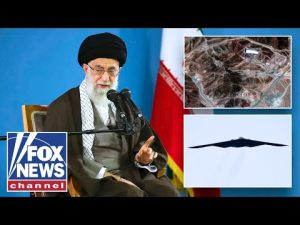In the world of international politics, things can often feel like a game of chess, with each move carefully calculated. Recent developments regarding the situation in Iran have sparked renewed discussions and concerns about nuclear weapons and foreign policy. One exasperated pundit expressed the worry that while the president has good instincts for maintaining peace, it is still unclear whether recent military actions have effectively curtailed Iran’s ambitions. After all, the stakes are high when nuclear weapons are involved.
Reports suggest that before the recent bombing campaign began, Iran managed to relocate a staggering 400 kilograms of enriched uranium to an undisclosed location. Now, this raises an eyebrow. Did our efforts actually slow down their nuclear aspirations, or did they just hit the ‘snooze’ button before continuing their plans? The unpredictability of such actions makes the entire situation a nail-biter. It’s like trying to guess where a game of “hot potato” will land. Will Iran choose a peaceful path and decide they are done with their aggressive antics? Or will they redouble their efforts and continue their sprint towards crafting a nuclear weapon?
It seems that there are two very distinct paths for Iran to choose from, but which one will they take? Many in the political realm have been pondering this question. It’s not just about the uranium; it’s about the overall strategy and how that fits into the bigger picture of global peace. If Iran genuinely feels a sense of fear and retribution from the recent attacks, perhaps they will reconsider their approach. However, history has shown that such adversaries don’t always operate rationally, and the door remains wide open for further escalation.
The discussion then shifts to the idea that every nation has its reasons for pursuing nuclear capabilities. For Iran, the perspective can be viewed through the lens of global power dynamics. Countries like the United States, France, and India each wield nuclear weapons, and there remains an unspoken understanding among nations: nuclear-armed countries tend to avoid conflicts. It’s an unsettling truth, but it fundamentally drives Iran’s intentions. They see nuclear capabilities as a security blanket, a means of deterring potential invasions.
So here we are, at a crossroads. The question looms large: how can the world move past this constant state of tension, especially when it feels like we’re stuck in a never-ending cycle of provocation? While one could lay blame on Iran’s warmongering behavior, it’s clear that both sides must take steps toward establishing better relations. Some optimists might argue that a diplomatic approach could lay the groundwork for reducing conflict and promoting peace. Maybe this tense situation will serve as a catalyst for changing attitudes, but it will certainly take great effort to foster an environment where nations aren’t always on a war footing.
As the world keeps a watchful eye on Iran, one thing is certain: it might be a long time before the full consequences of recent actions are understood. Whether Iran opts to join the ranks of cooperative nations or barrels forward with their nuclear dreams remains an open question. Until then, we can only hope that global leaders will navigate these perilous waters with wisdom and a steady hand. In the end, it’ll take a mix of strategy, patience, and perhaps a dash of goodwill to turn this ship around.







